Participants Post-Conference Expert Workshop

Colin ARMSTRONG
Colin is Head of Science and Policy Advice for SHED (Science in Humanitarian Emergencies and Disasters). He works with and on behalf of UK Government Departments to implement the recommendations from the Government Office for Science report on the “Use of Science in Humanitarian Emergencies and Disasters”. He is responsible for the co-ordination of two expert groups – a Risk and Horizon Scanning Expert Group (RHEG) and a Humanitarian Emergency Expert Group (HEEG) – designed to inform Ministerial decisions on emerging international risk and emergencies. These groups, chaired by the Government’s Chief Scientific Adviser (GCSA), aim to make a real difference to the way that the UK prepares for and predicts humanitarian emergencies and disasters. Colin also manages relations and flows of information with multiple stakeholders (government, research, private sector and non-government organisations) in the UK and internationally to increase capacity to anticipate disasters and reduce disaster impacts. In addition, he provides oversight to the UKCDS Disaster Research Group. Colin previously work at the Department of Health where he was responsible for the development of a £2million research programme for pandemic influenza. During the 2009 ‘swine flu’ pandemic, Colin supported the Scientific Advisory Group for Emergencies, which provided scientific and technical advice to UK Government. He also project managed the development of a national policy document outlining the UK strategy for pandemic influenza preparedness. Prior to working in the Department of Health, Colin worked on fire and resilience research at the Department for Communities and Local Government. He has an MSc in Biosystems and Informatics from the University of Liverpool, and a BSc (Hons) in Genetics from the University of Nottingham.

Hachim BADJI
Hachim is 49 years old and is from a Senegalese - Finnish mixed origin. He graduated as a civil engineer first, and has a master degree in Mathematics, both from the Montreal University (Canada). He holds an MBA from Edinburgh Business School (UK). Hachim spent most of his professional carrier in humanitarian and development fields with the Finnish Red Cross (1990-1993), the International Committee of the Red Cross (ICRC) during 1993-1997 and 1999-2009, and during 1997-1999 With the International Federation of Red Cross & Red Crescent Societies (IFRC). During his Red Cross 20 years field carrier, he was posted in Rwanda, DRC, Chechnya, Bosnia, Madagascar, Cote d’Ivoire (covering 16 countries), India (covering 4 countries), Kenya (covering 3 countries), Serbia (covering 4 countries), Sri Lanka, and has occupied many regional positions. He joined UNDP in 2010 as the Senior Coordinator of CADRI (Capacity for Disaster Reduction Initiative), a joint UNDP, OCHA, UNICEF, WFP, FAO, WHO, GFDRR, WMO, UNITAR, UNOPS and IFRC initiative and still holds this position. Hachim’s carrier with the Red Cross has mainly been in coordinating large scale humanitarian operations, and supporting 44 national Red Cross Societies develop their capacities for humanitarian as well as development work. As head of CADRI he has led since 2010 an inter-agency team in supporting governments and UN agencies develop their capacities in disaster risk reduction in over 40 countries.

Pedro BASABE
Pedro Basabe, geologist and Dr. ès Sc. in hydrogeology, has vast expertise in applied geology, natural hazard identification, mapping, monitoring systems, research and project management since 1979. During the nineties, he formulated and implemented several international projects on disaster risk management in Latin America for the Swiss Agency for Development and Cooperation, Humanitarian Aid (SHA) in coordination with the UN. He is also UNDAC and SHA member since 1995 participating in number of disaster preparedness, evaluation and coordination missions. He joined the UN Office for Disaster Risk Reduction (UNISDR) in November 2001, where has have increased responsibilities, contributing to DRR knowledge and capacity development, publications, partnership development, drought risk reduction practices and linkages with humanitarian sector to promote holistic and integrated disaster risk management. The last five years he has been heading the UNISDR Regional Office for Africa in Nairobi, actively developing collaboration with the Africa Union Commission, Regional Economic Communities, 38 countries, UN partners, donors and scientific-technical community. As result, Africa has a continental Programme for Disaster Risk Reduction, mechanisms for coordination, Sub-regional policies and/or programmes, some of them implemented in several countries. Mr. Basabe is currently back at the UNISDR headquarters, in charge of science, technology and expertise for disaster risk management, water and disasters and partnership development to translate policies into practices.

John BIRCHAM
Dr John Bircham is the principal of Bircham-Global, an Australasian consultancy that specializes in the resolving of wicked problems; the researching, formulating and developing of strategies and products for government and business as they confront the ongoing demands of society for greater performance - “more for less.” A former research scientist and modeller, he holistically integrates into his consultancy, teaching, writing and speaking activities: his life-long study of the effects of pressure on complex adaptive systems; his interest in ecology, psychology and neurophysiology; and his knowledge and hands-on experience of leadership, culture, strategy, organizational behaviour, risk and resilience in the workplace, and the management and governance suites.

Joern BIRKMANN
Joern holds a PhD in Spatial Planning from the Dortmund University and a post-doctoral degree in Geography (Habilitation) from the University of Bonn, Department of Geography. Furthermore, he holds a licence as urban planner. He has broad expertise in the field of vulnerability, sustainable development and environmental assessment. He is specialized in the area of the development of assessment methodologies and indicators to estimate and evaluate different socio-economic trends and environmental degradation at sub-national, local and household scale. He is currently IPCC Lead-Author in the IPCC Special Report “Managing the Risk of Extreme Events and Disasters to Advance Climate Change Adaptation”. He is also Lead-Author in the Fifth Assessment Report of the IPCC in the chapter "Emergent Risks and Key-Vulnerabilities". His work experience also encompasses research activities and lectures, for example in London and Mexico. Besides research and training activities at UNU-EHS, Joern also teaches at the Institute for Geography at the University of Bonn. He is currently involved in vulnerability assessment in coastal and flood-prone communities in Indonesia and Vietnam and also coordinates the development and testing of indicators to measure vulnerability to floods, heatwaves and droughts, as well as sea level rise in Germany, Egypt and Indonesia.

Deborah M. BROSNAN
Deborah M. Brosnan is Professor of Biology (adj) at Virginia Tech USA, environment and policy scientist at University of California Davis One Health Institute and President of the Brosnan Center. She received her Ph.D in marine ecology from Oregon State University. She works on the interface of ecosystem science and its application to disaster risk reduction and environmental decision-making. She uses a multi-disciplinary approach. She is translational scientist, convening scientific teams, to work with governments and stakeholders find science-based solutions to complex environmental challenges. Her research focuses on evaluating coupled ecological and human risks to extreme events, and solutions that often include designing and implementing coastal and marine ecosystem restoration for future conditions and risks. Her work has included SE Asia tsunami, volcanic eruptions, hurricane events, major floods, and human-induced disasters. She is Board member of the U. C Davis One Health Institute SeaDoc Society, Chair of the International Irish Scientists Network, Science Board member for St Barths Dept, of Environment, and editor of the Journal of Marine Biology and Oceanography

Julie CALKINS
Julie is currently a research consultant with UKCDS, evaluating the current supply and demand of scientific knowledge and technology for disaster risk reduction. She is an applied interdisciplinary scientist specializing in the health impacts of natural hazards and has been involved in projects that aim to reduce disaster risk and exposure in hazard settings by using interdisciplinary methods. Previously Julie completed a PhD at the University of York examining risk of exposure to volcanic fluoride in Nicaragua, Vanuatu and Iceland, and went on to be a post-doctoral research fellow at the University of Leeds working with global collaborators on Saharan desert dust and climate science knowledge exchange. In a prior role at Public Health England, she focused on providing technical support for DRR and climate change adaptation mainstreaming across the health sector, while also coordinating case studies for the UNISDR STAG.

Ioana CREITARU
Ioana Creitaru is capacity development specialist at the Capacity for Disaster Reduction Initiative (CADRI), an inter-agency initiative of UNDP, OCHA, UNICEF, WFP, FAO, WHO, WMO, UNITAR, UNOPS, GFDRR and IFRC. In her capacity, Ioana provides country level advisory services in capacity development for disaster risk reduction to Governments, UN Country Teams and other national stakeholders. This entails supporting national partners in undertaking capacity assessments, and in developing national plans of action for capacity development in disaster risk reduction. Ioana’s areas of work also include developing training and learning modules and packages, and delivering workshops at national, regional and global levels, primarily on topics related to disaster risk reduction, disaster preparedness for emergency response, climate risk management and mainstreaming risk reduction into development planning. Ioana’s geographical coverage includes English, French and Spanish-speaking countries in Africa, South-Eastern Europe and the CIS, Central Asia and the Caucasus, South-East Asia, Central America and the Caribbean. A Romanian national, Ioana holds a Master’s degree from the University of Geneva, and is a PhD candidate at the Graduate Institute for International and Development Studies, Geneva.

Carmelo DI MAURO
Carmelo Di Mauro is an environmental engineer with more than twenty years experience in the applied science, in particular in the field of risk-based decision-making processes. He worked at TNO (TNO Institute of Environmental Sciences, Energy Research and Process Innovation, The Netherlands) and in 2001 he joined the Joint Research Centre (JRC) of the European Commission where he remained until 2009. At the moment he is working for RGS S.r.l (Risk Governance Solutions), a consultancy company that he founded in 2009. During his career he worked in collaboration with many environment ministries and regional authorities. He managed several projects to implement and develop national and international program related to environmental protection and disaster management. He contributed to define the EC Council Directive 114/2008 on "Identification and Designation of European Critical Infrastructures and the assessment of the need to improve their Protection" and the 15 of December 2008 I received a “JRC Excellence Award” for the Support to EU Policy. He is teaching Risk Management and Business Continuity at the University of Applied Sciences and Arts of Southern Switzerland (SUPSI).
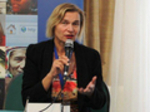
Mechthilde FUHRER
Mechthilde Fuhrer has been active in the field of educational, cultural and environmental issues and holds a Doctorate in Human Sciences and a Master degree in Social and Cultural Anthropology. She has worked since 1996 in the Council of Europe as Deputy Executive Director at the European Centre for Modern Languages, then as administrator in the field of Citizenship and human rights education, Education Policies and European Dimension, Higher Education and History Teaching, Democratic Governance, Culture and Diversity. At present she acts as Deputy Executive Secretary of the European and Mediterranean Major Hazards Agreement (EUR-OPA). This 1987 International Agreement is a platform of cooperation between European and Southern Mediterranean states in major natural and technological hazards. Within her functions she is working amongst others on promotion through appropriate common initiatives with other organisations in the field of major hazard prevention and organisation of relief.
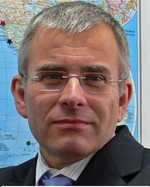
Carl GIBSON
Carl originally undertook research into infectious diseases of the brain within the UK and was subsequently involved in leadership roles in a number of State and national emergency responses to emerging and exotic diseases within Australia. He has also previously served with the British Army and was a sworn officer with the London Metropolitan Police. He has worked on a range of programmes in biosecurity, protective security, risk management, crisis and emergency response in the Asia-Pacific region, Africa, North America and Europe. This has included senior positions in government, corporate and not for profit sectors. Carl is currently the Director, Risk Management at La Trobe University where he has applied research interests in emergency response performance, organisational and community resilience and organisational catastrophic failure. He also holds the position of Incident Controller with responsibility for incident and emergency response at eight locations across the State of Victoria. In 2013 he was awarded an Emergency Services Foundation Scholarship, with which he undertook a study in the USA into the neuroscience of decision making of first responders under stress and risk in non-routine environments. Some of the outcomes of this research have been incorporated into the new approach for assessment of risk, criticality and vulnerability as part of the Victorian State Government’s all hazards arrangements for critical infrastructure. He is currently providing training to police, fire, State Emergency Services, a range of government portfolios, special taskforces and NGO volunteers in an application of this work to improve front line safety and performance effectiveness in emergency and disaster response. Carl is also active as part of the leadership team for one of the Country Fire Authority’s volunteer brigades as a frontline operational firefighter and training officer. He has served in a number of major bushfire emergencies, including the 2009 Black Saturday fires, one of Australia’s largest natural disasters.
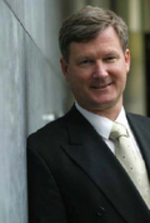
Bernhard M. HÄMMERLI
Dr df Bernhard M. Hämmerli is a Swiss computer scientist in the fields of communications, networks and information security, specifically critical infrastructure protection in the European Union. He is teaching internationally as a professor at both the Lucerne University of Applied Sciences and Gjovik University College. He was on the Press Editorial Board of the IEEE Computer Society from 2007 to 2012, has been president of the Swiss Informatics Society from 2009 and chair of the platform ICT Security of the Swiss Academy of Engineering Science since 2012.

Kai LIU
Kai Liu is an Associated Professor at the Academy of Disaster Reduction and Emergency Management Ministry of Civil Affairs & Ministry of Education (Beijing Normal University). She is currently involved in research of Risk Analysis of Infrastructure and Buildings Subjected to Natural Hazards as well as Seismic retrofitting techniques for rural structures. She has been involved in various research projects co-authored numerous publications in her field of expertise.
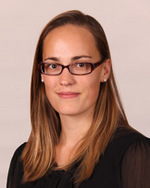
Rebecca LORDAN
Rebecca Lordan is a third year PhD Student at the Harris School of Public Policy at the University of Chicago and a visiting researcher at the Paul Scherrer Institute. As an undergraduate student, Rebecca studied Chemistry. Bringing this background to bare, her current areas of interest include energy and environmental policy, science and technology policy, and decision-making under risk and uncertainty. As a part of the collaboration between the University of Chicago and the Paul Scherrer Institute, Rebecca is working with the Technology Assessment Group on comparative risk and threat assessments for various energy systems including nuclear power, fossil fuels and hydro power.

Alexandros MAKARIGAKIS
Mr. Makarigakis has a total of more than 18 years of progressively responsible experience in the field of environmental sciences, 12 of which on the international platform on issues of development in developing and developed countries with focus on natural resources management (water and environment). Eleven years working at an International Organization (UNESCO), eight years of experience in the field of bioremediation of hazardous chemicals and three years in municipal water and wastewater purification. Experience includes representing UNESCO’s Natural Science sector at Windhoek Cluster Office, at Addis Ababa Liaison Office and Chief of the Cross Cutting Thematic Unit on Disaster Risk Reduction (DRR), university lecturing, the design and execution of innovative bench-scale treatment systems and mathematical model developments for further scale-up purposes as well as in-situ testing for verification, groundwater remediation and waste management. Mr. Makarigakis is currently the chair of the Global Alliance for Disaster Risk Reduction and Resilience in the Education Sector (GAD3RES) and member of the High Level Committee on Programme / Senior Management Group of the United Nations on DRR

Alan MARCH
Dr Alan March is Associate Professor in Urban Planning & Design. He is Associate Dean (Undergraduate) in the Faculty of Architecture, Building and Planning and is Director of the Bachelor of Environments at the University of Melbourne. Alan has a Bachelor degree (Dist.) in Urban and Regional Planning, a Masters of Town and Country Planning and a PhD (Urban Planning). He is a Certified Practicing Planner with full membership of the Planning Institute of Australia. He has practiced since 1991 in a broad range of private sector and government settings and has had roles in statutory and strategic planning, advocacy, and urban design. He has also worked as a planner in Western Australia, the UK, New South Wales and Victoria. Alan’s recent publications and research include examination of the practical governance mechanisms of planning and urban design, in particular the ways that planning systems can successfully manage change and transition as circumstances change to incorporate risk among a range of wider concerns. Alan’s 2012 book The Democratic Plan examines planning systems and the challenges they face in making decisions in complex institutional and democratic settings. He is particularly interested in the ways that strategic planning can modify outcomes, and undertakes research into urban design and governance. His current work considers the ways that urban planning is seeking to establish new ways to spatialise urban management. He has a number of recent publications that deal with urban planning and disaster risk reduction and has a particular focus on wildfire. Alan recently established a number of new university qualifications that incorporate risk management into built environment professional education.

Satoru NISHIKAWA
Joined Japanese Government service in 1982. In 1988, appointed visiting research scholar at MIT. In 1992, took the position of Senior Disaster Relief Coordination Officer at UN Department of Humanitarian Affairs where he coordinated international assistance to numerous disaster stricken countries. In 2001, was appointed as the Executive Director of Asian Disaster Reduction Center. After resuming Japanese government service in 2004, held senior positions in the Cabinet Office and Ministry of Land, Infrastructure, Transport and Tourism. At the wake of the Indian Ocean Tsunami in December 2004, coordinated the Japanese Government technical assistance to the affected countries. Hosted and coordinated the 2005 UN World Conference on Disaster Reduction where the Hyogo Framework for Action was adopted. Proposed the Japanese BCP guideline in 2005. Initiated the long term regional recovery planning for Tohoku after the Great East Japan Earthquake in March 2011. Presently, Vice-President of Japan Water Agency. Academic board member of the Institute of Social Safety Science. Board member of Business Continuity Advancement Organization. Previous Chair of the World Economic Forum Global Agenda Council on Catastrophic Risk. Member of the Advisory Group on the Post-2015 Framework for Disaster Risk Reduction and the Global Platform

Francesco PISANO
Francesco Pisano leads the Department of Research at UNITAR, where he oversees policies and programmes to translate learning and other technologies into actionable tools to support and enhance the action of the United Nations. He is an expert in international affairs and geopolitics with a professional background in humanitarian affairs and risk management. He studied international relations with a specialisation in conflict resolution, and law with a specialisation in international and constitutional law. He joined the United Nations in 1993 where he worked initially with the UN Department of Humanitarian Affairs. He was then a leading senior expert with the ISDR Secretariat in the early 2000 and later the Manager of UNOSAT, the Operational Satellite Applications Programme of the UN.

Armin PREIS
Armin Preis is an Austrian management researcher and consultant. His work at the Vienna University of Technology deals with integrated control systems for risk-, crisis- and continuity-management. He is an expert in cybernetic modelling of complex, viable systems. Previously, he worked as computer scientist for e-health at the Austrian Institute of Technology, as project manager for sustainable computer supported facility management, as crisis counselor and leader of an Austrian startup for trusted e-commerce. His current working focus lies on the organizational development of the Austrian Railway Infrastructure Corporation.

Sergey PULINETS
Prof. Sergey Pulinets is a Principal Research Scientist in the Space Research Institute of the Russian Academy of Sciences, Moscow, Russia. He has more than 35 years of experience in Space Plasma Physics, Physics of the Ionosphere, and Geophysics. Dr. Pulinets is a leader of an international team of scientists proposing the Lithosphere-Atmosphere-Ionosphere coupling concept related to seismo-tectonics, active faulting and earthquake processes. Dr. Pulinets is a co-convener of the American Geophysical Union, fellow of IUGG Inter Association Working Group on Electromagnetic Studies of Earthquakes and Volcanoes (EMSEV), correspondent member of International Radio Science Union (URSI), International Committee of Space Research (COSPAR), fellow of URSI/COSPAR International Reference Ionosphere (IRI) Working Group, fellow of United Physical Society of Russia, member of editorial board of Geomagnetism and Aeronomy journal.

Andreas RECHKEMMER
Andreas Rechkemmer is chief science and policy advisor of the Global Risk Forum, Davos, Switzerland and has recently been appointed American Humane Endowed Chair at the University of Denver. Rechkemmer is a scholar and practitioner of international relations and political science. He has a background in United Nations diplomacy and science-to-practice management, particularly in the areas of global environmental change and climate change, sustainability, human development, and the human and societal dimensions of risk and security. His scholarship also focuses on One Health, a multidisciplinary effort to attain optimal health for people, animals and the environment. He is a professor of human dimensions of natural resources (affiliate faculty) at Colorado State University, a guest professor at Beijing Normal University in China and an adjunct professor at the University of Cologne in Germany.

Ortwin RENN
Ortwin Renn serves as full professor for Environmental Sociology and Technology Assessment and as Dean of the Economic and Social Science Department at the University of Stuttgart, Germany. He directs the Stuttgart Research Center for Interdisciplinary Risk and Innovation Studies at the University of Stuttgart (ZIRIUS) and the non-profit company DIALOGIK, a research institute for the investigation of communication and participation processes in environmental policy making. Renn also serves as Adjunct Professor for “Integrated Risk Analysis” at Stavanger University, Norway and as Affiliate Professor for “Risk Governance” at Beijing Normal University. He co-directs the German Helmholtz-Alliance, “Future infrastructures for meeting energy demands towards sustainability and social compatibility,“ with Armin Grunwald. Ortwin Renn has a doctoral degree in social psychology from the University of Cologne. His career has included teaching and research positions at the Juelich Nuclear Research Center, Clark University (Worcester, USA), the Swiss Institute of Technology (Zurich) and the Center of Technology Assessment (Stuttgart). He is a member of the Scientific Advisory Board of EU President Barroso, the Scientific and Technical Council of the International Risk Governance Council (IRGC) in Lausanne, the National Academy of Disaster Reduction and Emergency Management of the People’s Republic of China and several national and international Academies of Science. In 2012, he was elected president of the International Society for Risk Analysis (SRA). Renn's honours include an honorary doctorate from the Swiss Institute of Technology (ETH Zurich), an honorary affiliate professorship at the Technical University Munich, the “Distinguished Achievement Award” of the Society for Risk Analysis (SRA) and several best publication awards. In 2012, the German Federal Government awarded him the National Cross of Merit Order in recognition of his outstanding academic performance. Renn is primarily interested in risk governance, political participation, as well as technical and social change towards sustainability. Renn has published more than 30 books and 250 articles, most prominently the monograph “Risk Governance” (Earthscan: London 2008).
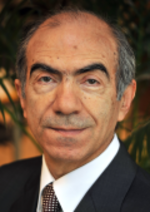
Badaoui ROUHBAN
Badaoui Rouhban is a specialist in disaster risk management. He advises public services, civil societies and non-goverrnmental organizations on capacity-building for disaster resilience. He served for several years at UNESCO, Paris, in the Programmes on natural hazards and the environment and is the former Director of UNESCO’s Unit for Disaster Reduction. He is a Global Risk Forum GRF Davos Senior Research Fellow. Dr Rouhban holds a Doctor of Engineering degree from the University Paris VI and has carried out post-doctoral research in engineering seismology at the Tokyo Institute of Technology.

Haresh SHAH
Professor Haresh Shah has been a pioneer in the fields of risk analysis, earthquake engineering, and probabilistic methods for over 35 years. He has served Stanford University in many capacities, including Chairman of the Department of Civil Engineering and Founding Director of the John A. Blume Earthquake Engineering Center. Haresh Shah is the author of one book, has contributed to chapters in many books and has been an author or co-author of more than 350 technical papers and reports. He has been keynote speaker at many national, international conferences and has been a regular keynote invited speaker for many corporations. He is a member of many Editorial Boards of Professional Journals and Professional Societies. Prof Shah received a B. E. degree (1959) from Poona University, India, and degrees of M. S. (1960) and Ph. D. (1963) from Stanford University. Prof. Shah has received many awards, including the John S. Bickley Gold Medal for Excellence Award from the International Insurance Society for his sustained and outstanding contributions to the insurance industry. Prof Shah was named as the “Top Seismic Engineer of the 20th Century” by the Applied Technology Council/Engineering News Record of USA in 2006. Prof. Shah was recently awarded the Alfred Alquist Medal from the Earthquake Engineering Research Institute of America for his contributions and service for earthquake safety to global community. Prof Shah was awarded the most prestigious EERI award, the 2013 Housner Medal for his extraordinary and lasting contributions to earthquake safety worldwide through the development and application of earthquake hazard reduction practices and policies. Most recently, Prof Shah was given “Bharat Gaurav” award by the India International Friendship Society (IIFS) in January 9, 2014 and awarded at the National Day Awards 2014 in Singapore with the Public Service Medal (PINGAT BAKTI MASYARAKAT) for his contributions in the Ministry of Education (FOS) on August 9, 2014.

Peijun SHI
Peijun Shi is the executive vice-president of Beijing Normal University. He received his Ph.D in palaeogeography at Beijing Normal University and gained postdoctoral experience at the College of Natural Resources at the University of California in Berkeley, USA. He is a member of the Expert Committee under the National Disaster Reduction Committee, which belongs to the Ministry of Civil Affairs of China. He is also a member of OECD’s High Level Advisory Board on Financial Management of Large-Scale Catastrophes. His research focuses on natural disaster theories and risk management. Shi has been charged with many relative national or ministerial programs and has numerous publications. He established the system of “regional natural disaster system” which consists of environment, hazard and society. Furthermore, he put forward the technological system of regional agricultural natural disaster assessment. Peijun Shi is currently co-chairing the IRG-Project.

Helen SULLIVAN
Helen Sullivan is a cognitive psychologist whose research seeks to understand the fundamental role that human perception and learning play in risk communication and preparedness. Dr Sullivan is particularly interested in the use of mobile technologies as a platform for risk reduction including the innovative use of mobile games to train preparedness behaviours. Her research interests have spanned the use of mobile phones for emergency notification, the perceptual characteristics of warning signs, the usability of electronic voting systems by people with disabilities, and learning models. Dr Sullivan is an adjunct professor in Psychology at Rider University and a senior researcher on the EU FP7 project Public Empowerment Policies for Crisis Management (PEP). She has presented her work in journals, at conferences and in workshops in the USA, Europe, China, and Japan. Dr. Sullivan is a member of the American Psychological Association and Sigma Xi. She is on the Science and Technology Advisory Committee of the Global Risk Forum Davos, and on the editorial board of the journal Planet@Risk. Dr. Sullivan received her Master of Science and PhD in experimental psychology from Saint Louis University.

Akhilesh SURJAN
Dr. Akhilesh Surjan is an Associate Professor at Kyoto University’s Inter-Graduate School Program for Sustainable Development and Survivable Societies (GSS Program). In addition, he also serves as ‘Visiting Associate Professor’ at United Nations University’s Institute for Sustainability and Peace (UNU-ISP). Since last 15 years, he has successfully engaged with issues of climate and disaster risk reduction and urban environmental management. Currently, he is serving as a Lead Author for the Fifth Assessment Report of the IPCC and also served as Contributing Author for the UN’s Global Assessment Report on Disaster Risk Reduction (2011). While mainly associating with UN agencies, Dr Surjan has also successfully worked in academic, civil society and government institutions in Asia. Dr Surjan has presented his research in international forums, edited newsletters, project reports, and contributed papers in international journals, peer-reviewed books and global seminars. He is regularly invited to lecture in universities, International, Governmental/ Non-Governmental forums & conventions, city-networks and other relevant training institutions. While working with UNU-ISP (2008-2012), Dr Surjan coordinated ‘Global Change and Sustainability’ module in UNU International Courses and an Advanced Seminar Course on Disaster Management and Humanitarian Assistance. Dr Surjan has been successfully generating competitive funding from both intergovernmental and corporate sectors, and is currently acting as the Project Leader for multi-country projects in Asia-Pacific Region. Dr Surjan is also a trained architect-planner – an interest zone that keeps him enthused when free.

Dennis WENGER
Dennis Wenger is the Program Director for program element 1638, Infrastructure Systems Management and Extreme Events, at the National Science Foundation (NSF). He is also the Acting Program Director for the Civil Infrastructure Systems program. He had previously been at NSF from 2001-2005. Dr. Wenger was a Professor from Texas A&M University from 1989-2007. At Texas A&M, Dr. Wenger was a Professor of Urban and Regional Science and an Adjunct Professor of Sociology. He was also the Founding Director and Senior Scholar of the Hazard Reduction & Recovery Center. Prior to his arrival at Texas A&M in 1989, Dr. Wenger was on the faculty of the University of Delaware where he served as Co-Director of the Disaster Research Center from 1984-1989 Dr. Wenger has been engaged in research on hazards and disasters for over 40 years. His research has focused upon the social and multidisciplinary aspects of natural, technological, and human-induced disasters. Specifically, he has studied such topics as local emergency management capabilities and response, police and fire planning and response to disasters, search and rescue and the delivery of emergency medical services, mass media coverage of disasters, warning systems and public response, factors related to local community recovery success, and disaster beliefs and emergency planning. He undertook the only empirical study of the evacuation of the World Trade Center towers after the first terrorist attack in 1993 and served as the principal investigator for the first project to Enable the Future Generation of Hazard Researchers. He is the author of numerous books, research monographs, articles and papers. Dr. Wenger currently serves as one of the nine members of the United Nations Scientific and Technical Committee to the International Strategy for Disaster Reduction. At NSF Dr. Wenger serves as the foundation s representative to the Roundtable on Disasters of the National Academy of Science. He also represents NSF on the Subcommittee on Disasters (SDR) which is associated with the Office of Science and Technology Policy. Dr. Wenger serves as the Co-Chair for Science of the SDR.

James Herbert WILLIAMS
Professor James Herbert Williams, PhD., is Dean and Milton Morris Endowed Chair at the Graduate School of Social Work at the University of Denver. He holds his MSW from Smith College, MPA from the University of Colorado and PhD in Social Welfare from the University of Washington-Seattle. Dr. Williams’ research and training has been funded by grants from several federal and state agencies and private foundations. Dr. Williams’ publications and community engagement focus on health promotion and disease prevention, health disparities, economic sustainability, human security, conflict resolution, delinquency and violence, mental health services for African American children in urban schools, disproportionate minority confinement of African American youth in the criminal justice system, community strategies for positive youth development, and social issues of the African American community. His scholarship has been published in several prominent health and social science journals. Dr. Williams has 30 plus years of experience as a scholar/educator and social work practitioner. He has served on two commissions for the Council on Social Work Education and as a member of the Society for Social Work and Research (SSWR) Board of Directors. He is the current President of the Board of Directors for the National Association of Deans and Directors of Schools of Social Work.

Qian YE
Dr. Qian Ye is Professor for climate change impacts at Beijing Normal University, deputy general secretary of the Chinese National Committee for IHDP and leading scientist of the Social and Economic Impact Assessment Group at Beijing Meteorological Bureau. He is executive director of the newly established IHDP core project, IRG Project and member of the Scientific Steering Committee. His current research interest is focused on the role of social and ecological dynamic system in dealing with climate change and its impacts.

Yang ZHANG
Dr. Yang Zhang is the Program Coordinator of the Master of Urban and Regional Planning program and the founding member of its new Disaster Resilience Graduate Educational Program at Virginia Tech. His research looks at post-disaster recovery and community resilience. His recent research has been funded by the National Science Foundation, the Virginia Sea Grant, the Lincoln Institute of Land Policy, the Institute of Society, Culture, and Environment, and the Global Issue Initiative. In 2010, Dr. Zhang was selected as a National Science Foundation Research Fellow on natural hazards and disasters.

